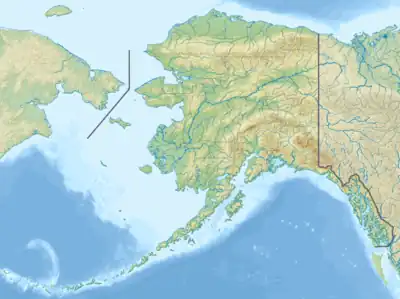| Twin Peaks | |
|---|---|
.jpg.webp) Twin Peaks seen from near Eklutna Lake | |
| Highest point | |
| Elevation | 5,840+ ft (1,780+ m)[1] |
| Prominence | 1,378 ft (420 m)[1] |
| Parent peak | Bashful Peak (8,005 ft) |
| Coordinates | 61°26′41″N 149°08′40″W / 61.44472°N 149.14444°W[1] |
| Geography | |
 Twin Peaks Location of Twin Peaks in Alaska | |
| Location | Chugach State Park Matanuska-Susitna Borough Alaska, United States |
| Parent range | Chugach Mountains |
| Topo map | USGS Anchorage B-6 |
| Climbing | |
| Easiest route | Scrambling class 3-4 |
Twin Peaks are a 5,840+ ft (1,780+ m) double summit mountain located in the Chugach Mountains, in Matanuska-Susitna Borough in the U.S. state of Alaska. The mountain is situated in Chugach State Park, 27 mi (43 km) northeast of downtown Anchorage, 11 mi (18 km) south of Palmer, and 2.5 mi (4 km) north of Eklutna Lake. East Twin Peak is the higher of the two, West Twin Peak is 5,472-foot (1,668 m), and Goat Rock is a 5249+ ft crag immediately west of both.[2][3] The nearest higher peak is Pioneer Peak, 4.26 mi (7 km) to the northeast.[1] Twin Peaks' descriptive name was reported by the United States Geological Survey in 1960, but the mountain was originally known as Lach Q'a in the Denaʼina language.[4] Climbing the mountain involves scrambling with dangerous loose rock. The trailhead for the Twin Peaks Trail is located at the end of Eklutna Lake Road near the boat launch; however, the trail ends far short of the summit.
Climate
Based on the Köppen climate classification, Twin Peaks are located in a subarctic climate zone with long, cold, snowy winters, and mild summers.[5] Temperatures can drop below −20 °C with wind chill factors below −30 °C. Precipitation runoff from the peak drains into tributaries of the Knik River.
See also
Gallery
References
- 1 2 3 4 "East Twin Peak, Alaska". Peakbagger.com. Retrieved 2019-06-04.
- ↑ "West Twin Peak". Peakbagger.com. Retrieved 2019-06-04.
- ↑ "Goat Rock, Alaska". Peakbagger.com. Retrieved 2019-06-04.
- ↑ "East Twin Peak". Geographic Names Information System. United States Geological Survey, United States Department of the Interior. Retrieved 2019-06-04.
- ↑ Peel, M. C.; Finlayson, B. L.; McMahon, T. A. (2007). "Updated world map of the Köppen−Geiger climate classification". Hydrol. Earth Syst. Sci. 11: 1633–1644. ISSN 1027-5606.
External links
- Twin Peaks weather: Mountain Forecast



.jpg.webp)

